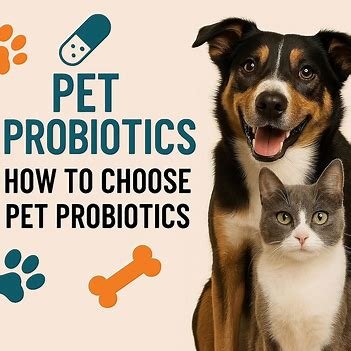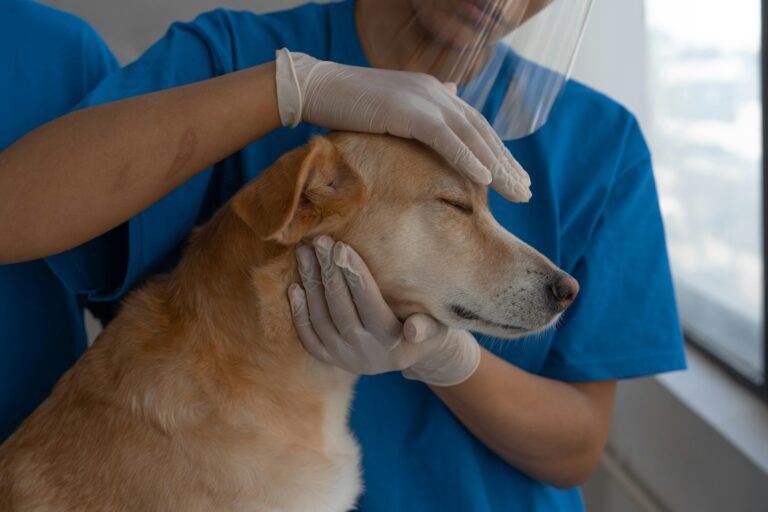Pet Probiotics: The $1 Billion Trend Every Pet Owner Should Know About

Pet Probiotics: The Ultimate Guide to Gut Health for Dogs & Cats
Pet probiotics aren’t just another wellness fad—they’re fueling a booming $1 billion industry. But what exactly are probiotics, and why are so many veterinarians and pet parents turning to them for better pet health? Let’s dig into this growing trend and what it means for your furry friend.
If you’ve noticed more probiotic treats, supplements, and even specialized pet foods hitting the shelves lately, you’re witnessing a revolution in pet care. From anxious rescue dogs finding their zen to senior cats regaining their appetite, probiotics are quietly transforming how we approach our pets’ wellness from the inside out.
What Are Pet Probiotics? A Beginner’s Guide to Gut Health
Simply put, pet probiotics are live beneficial bacteria and yeasts that support your pet’s digestive system. Think of them as tiny superheroes working inside your dog’s or cat’s gut to maintain a healthy balance of microorganisms.
Just like humans, pets have a complex ecosystem of bacteria living in their intestines—what scientists call the gut microbiome. When this ecosystem gets out of balance (due to stress, illness, antibiotics, or poor diet), it can lead to digestive issues, weakened immunity, and even behavioral changes.
Dog probiotics and cat probiotics work by:
- Replenishing good bacteria in the digestive tract
- Crowding out harmful bacteria and pathogens
- Supporting the intestinal barrier function
- Enhancing nutrient absorption
- Boosting immune system response
The most common probiotic strains for pets include Lactobacillus acidophilus, Bifidobacterium animalis, and Enterococcus faecium—names that might sound intimidating but represent some powerful allies for your pet’s health.
Why Pet Probiotics Are Trending: Science Meets Pet Parent Demand
The surge in pet probiotics isn’t happening by accident. Several converging factors have created the perfect storm for this wellness trend:
The Human Health Connection
As more people discover the benefits of probiotics for their own digestive health, they naturally wonder: “Could this help my pet too?” This curiosity, combined with increasing pet humanization trends, has driven unprecedented interest in digestive health for pets.
Veterinary Research Breakthrough
Recent studies have shown compelling evidence for probiotic benefits in pets. Research published in veterinary journals demonstrates that specific probiotic strains can reduce diarrhea episodes, improve skin conditions, and even help with anxiety-related behaviors in dogs and cats.
The Premium Pet Care Movement
Modern pet parents are willing to invest in preventive care rather than just treating problems after they arise. The global pet supplements market reflects this shift, with probiotics leading the charge as pet owners seek proactive wellness solutions.
Antibiotic Awareness
As awareness grows about antibiotic overuse and its impact on gut health, more pet parents are looking for natural ways to support their pets’ digestive systems both during and after antibiotic treatments.
Proven Benefits of Probiotics for Dogs and Cats
The science behind pet probiotics reveals some impressive health benefits that go far beyond basic digestion:
- Enhanced Digestive Health: Gut health for dogs and cats improves significantly with regular probiotic supplementation. Pets experiencing chronic loose stools, gas, or irregular bowel movements often see improvements within 2-4 weeks.
- Stronger Immune System: Did you know that approximately 70% of your pet’s immune system is located in their gut? By supporting beneficial bacteria, probiotics help strengthen your pet’s natural defenses against infections and illnesses.
- Improved Skin and Coat Health: Many pet parents report shinier coats and reduced skin irritation after introducing probiotics. This connection between gut health and skin health—often called the gut-skin axis—is particularly noticeable in pets with food sensitivities or environmental allergies.
- Better Mood and Behavior: The gut-brain connection isn’t just real in humans—it affects our pets too. Some dogs and cats show reduced anxiety, improved appetite, and better overall mood when their gut microbiome is balanced.
- Enhanced Nutrient Absorption: Probiotics help pets get more nutrition from their food by improving how well the intestines absorb vitamins, minerals, and other essential nutrients.
Are Pet Probiotics Safe? Understanding Risks and Veterinary Guidance
While pet probiotics are generally considered safe for healthy dogs and cats, it’s important to understand potential risks and when to consult your veterinarian.
When Probiotics Are Typically Safe
- Healthy adult dogs and cats
- Pets recovering from antibiotic treatment
- Animals with mild digestive upset
- Pets transitioning to new foods
When to Exercise Caution
Pet probiotics may not be appropriate for:
- Immunocompromised animals
- Pets with severe underlying health conditions
- Very young puppies and kittens (under 8 weeks)
- Animals currently taking certain medications
The Importance of Veterinary Consultation
Before starting any probiotic regimen, especially for pets with existing health issues, consult your veterinarian. They can recommend appropriate strains, dosages, and timing based on your pet’s specific needs and health status.
Quality control is crucial—not all probiotic products are created equal. Look for supplements that guarantee live cultures at the time of consumption and have undergone third-party testing.
Top Probiotic Sources and Products for Pets
Pet parents have more options than ever when it comes to incorporating probiotics into their pets’ routines:
Probiotic Supplements
- Powder forms: Easy to sprinkle on food, often most cost-effective.
- Capsules: Convenient for precise dosing, can be opened and mixed with food.
- Chews: Tasty option for pets who see them as treats.
Probiotic-Rich Foods
- Fermented vegetables (in small amounts)
- Plain, unsweetened yogurt (for pets who tolerate dairy)
- Kefir (in moderation)
Specialized Pet Foods
Many premium pet food brands now incorporate probiotics directly into their formulas, making daily supplementation automatic.
Natural Prebiotic Sources: Don’t forget about prebiotics—the fiber that feeds beneficial bacteria. Sweet potatoes, pumpkin, and chicory root are excellent natural prebiotic sources for pets.
Market Growth and Future Outlook: The $1 Billion Pet Probiotics Boom
The numbers tell a compelling story about the future of pet probiotics. Industry analysts project the global pet supplements market will reach $1.05 billion by 2027, with probiotics representing one of the fastest-growing segments.
Key Growth Drivers
- Increasing pet ownership, especially among millennials and Gen Z
- Rising awareness of preventive pet healthcare
- Growing acceptance of functional foods for pets
- Expanding research supporting probiotic benefits
Consumer Trends Shaping the Market
Pet parents are becoming more sophisticated consumers, seeking:
- Transparency in ingredient sourcing
- Scientific backing for health claims
- Strain-specific probiotics for targeted benefits
- Sustainable and ethical product options
This trend shows no signs of slowing down, as more veterinary professionals incorporate probiotic recommendations into routine wellness plans.
How to Choose the Right Probiotic for Your Pet: A Practical Guide
With so many options available, selecting the best probiotic for your dog or cat can feel overwhelming. Here’s a step-by-step approach:
- Step 1: Identify Your Pet’s Specific Needs
- Digestive support for general wellness
- Recovery support after antibiotics
- Management of chronic digestive issues
- Immune system enhancement
- Skin and coat improvement
- Step 2: Look for Quality Indicators
- CFU count: Look for products with at least 1 billion CFUs per serving.
- Strain diversity: Multiple beneficial strains often work better than single strains.
- Stability: Shelf-stable products or proper refrigeration requirements.
- Third-party testing: Verification of potency and purity.
- Step 3: Consider Your Pet’s Preferences
- Picky eaters might prefer flavored chews.
- Food-motivated pets often do well with powder forms.
- Senior pets might need easier-to-digest options.
- Step 4: Start Slowly and Monitor
Begin with a smaller dose than recommended and gradually increase while monitoring your pet’s response. Most pets show improvement within 2-6 weeks of consistent use.
Expert Opinions and Research Insights
Leading veterinary nutritionists and researchers are increasingly recognizing the potential of probiotics in pet healthcare.
Dr. Sarah Johnson, a board-certified veterinary nutritionist, notes that “the gut microbiome research in companion animals is rapidly expanding, and we’re seeing compelling evidence for targeted probiotic therapy in various conditions.”
Recent studies have shown particular promise in:
- Reducing antibiotic-associated diarrhea in dogs by up to 60%.
- Improving skin condition scores in cats with food sensitivities.
- Supporting immune response in senior pets.
- Reducing stress-related digestive upset in shelter animals.
The American Kennel Club (AKC) has also recognized the growing body of evidence supporting probiotic use in dogs, particularly for digestive health and immune support.
For additional expert insights on pet nutrition, the Association of American Feed Control Officials (AAFCO) provides valuable resources on supplement safety and efficacy standards.
Why Every Pet Owner Should Care About Probiotics
The rise of pet probiotics represents more than just a market trend—it reflects our evolving understanding of pet wellness and the crucial role of digestive health in overall quality of life.
For pet parents, probiotics offer a proactive approach to supporting their furry family members’ health. Rather than waiting for digestive problems to arise, incorporating quality probiotics into your pet’s routine can help maintain optimal gut health and potentially prevent issues before they start.
The $1 billion pet probiotics industry isn’t built on hype—it’s founded on genuine benefits that pet parents are witnessing firsthand. From improved digestion to better immune function, the positive impacts of probiotics are changing how we think about pet nutrition and wellness.
As research continues to unveil new connections between gut health and overall wellbeing in pets, probiotics are likely to become even more integrated into standard pet care practices. The question isn’t whether probiotics work for pets—it’s about finding the right probiotic strategy for your individual furry friend.
Frequently Asked Questions About Pet Probiotics
Can I give my dog human probiotics?
While some human probiotics might be safe for pets, it’s not recommended. Pet-specific probiotics are formulated with strains that are proven beneficial for dogs and cats, and they avoid ingredients that might be harmful to pets (like xylitol in human supplements).
How long does it take for probiotics to work for pets?
Most pets show initial improvements in digestion within 5-10 days, with more significant benefits appearing after 2-6 weeks of consistent use. The timeline can vary based on your pet’s individual health status and the specific probiotic product used.
Do pet probiotics need to be refrigerated?
Not all pet probiotics require refrigeration. Many modern formulations are shelf-stable, but always check the product label for storage requirements. Refrigerated probiotics aren’t necessarily better—stability depends on the specific strains and manufacturing process.
Can probiotics help with my cat’s bad breath?
Yes, probiotics can help improve oral health and reduce bad breath in cats by supporting beneficial bacteria in the mouth and digestive system. However, persistent bad breath should be evaluated by a veterinarian to rule out dental disease or other health issues.
Are there any side effects of probiotics for pets?
Most pets tolerate probiotics well, but some may experience mild digestive upset (gas, loose stools) when first starting supplements. These effects typically resolve within a few days. If symptoms persist or worsen, consult your veterinarian.
Should I give probiotics to my puppy or kitten?
Very young puppies and kittens (under 8 weeks) have developing immune systems and should only receive probiotics under veterinary guidance. For older puppies and kittens, probiotics can be beneficial, especially during weaning or vaccination periods.
Thank you for joining us on this deep dive into the fascinating world of pet probiotics! At JoyFluffy, we’re passionate about helping pet parents make informed decisions about their furry family members’ health and happiness. Have questions about probiotics or other pet wellness topics? We’d love to hear from you in the comments below!




